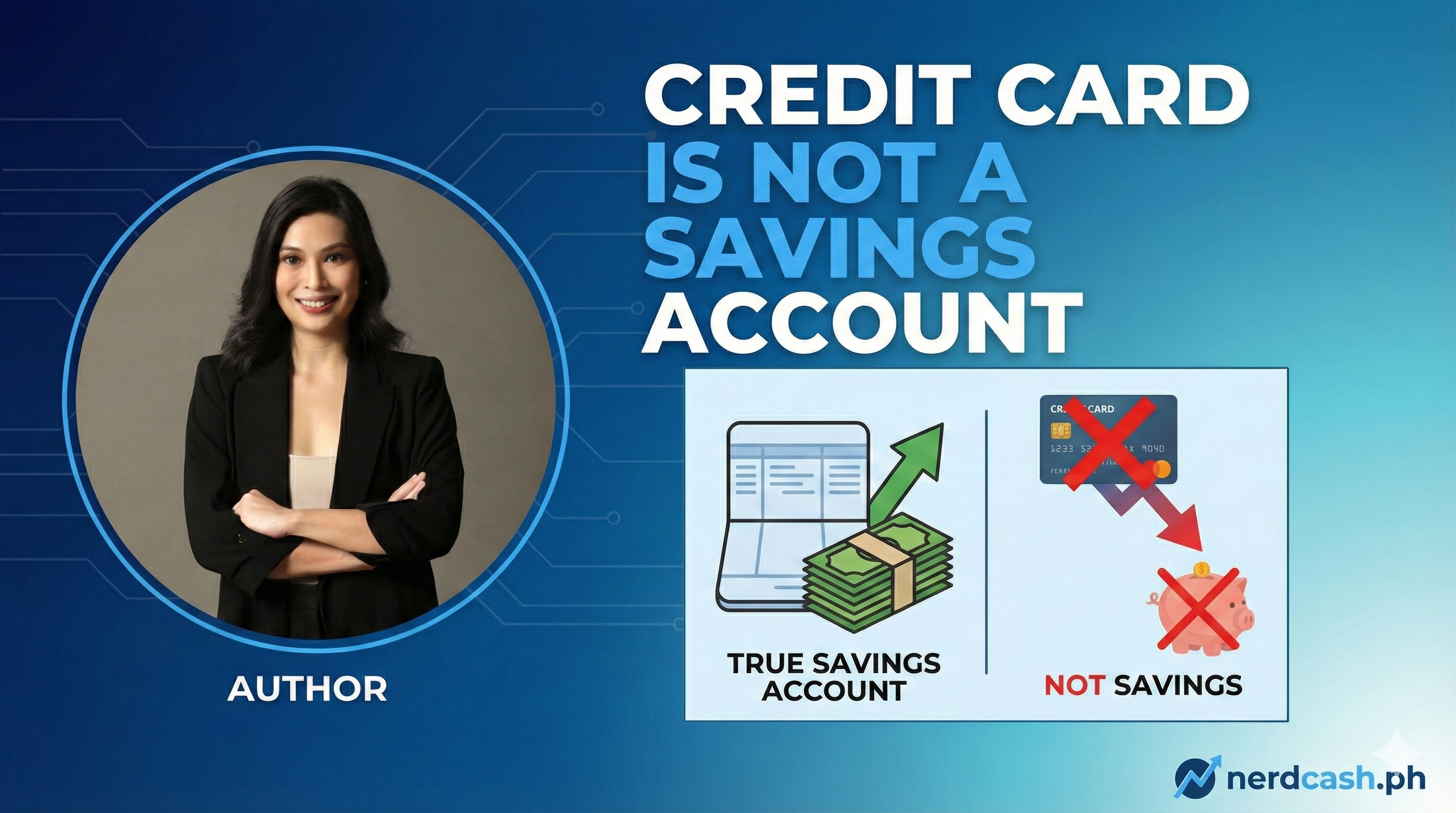Mariel Bitanga has spent 10 years as a registered financial planner helping Filipinos navigate their money. But her journey started in a place many of us know too well, drowning in debt and desperate for answers.
Mariel Bitanga didn't grow up learning about money management. In fact, it was quite the opposite.
"I grew up in an environment where my parents were not really the best at managing money, and it led us to a lot of financial burden," she admits. "It traumatized me."
That childhood experience became the catalyst for everything that followed. As she started earning her own money, Mariel became determined not to repeat the same mistakes. She sought out mentors, educated herself, and eventually became a Registered Financial Planner, licensed by the Insurance Commission of the Philippines.
Now, after a decade in the financial services industry, she's on a mission to help others avoid the painful lessons she learned the hard way.
The Wake-Up Call: When Credit Cards Became a Trap

Ask Mariel about her biggest credit card mistake, and she doesn't sugarcoat it.
"Overspending. Swiping as if it was an extension of my savings account," she says. "Getting to a point where I couldn't pay in full and having to scramble my way out of that, almost feeling like you're drowning because it feels as if you can't ever get out of it."
She describes working month after month, only to watch most of her salary disappear into credit card payments. "It was very traumatizing. I really didn't like that feeling."
But here's the thing that makes Mariel's story so relatable: even after that experience, she still found herself in situations where she couldn't pay in full.
"It's a constant muscle that you have to keep building: this discipline," she explains. "Just like working out. You don't just work out for one year and then stop, and you're fit forever, right? It's a constant routine that you have to work on constantly."
Breaking the "I'm Not Good With Money" Myth
Through hundreds of conversations with clients, Mariel has identified one belief that holds people back more than any other.
"They think they're not good with money," she says. "But honestly, I believe that you aren't born good with money. Even if you were born rich, it doesn't necessarily mean you're good with money."
It's a muscle you build through education, surrounding yourself with financially savvy people, and practicing discipline. "It's not easy to be good with money. It's not the easiest for everyone, but it's not impossible."
Her Unconventional First Credit Card
Mariel's first adult credit card experience was anything but typical. Fresh out of school and without enough credit history to qualify for her own card, a colleague made an unusual offer.
"My office mate said, 'Why don't I make you my supplementary?' She wanted to earn points or something," Mariel recalls. "I had to pay her every month, and it was actually kind of nice because I was forced to pay in full every month. Obviously it was embarrassing if I didn't pay my friend."
The shared limit also made her more mindful of her spending. "I had to control when I would swipe because we were sharing a limit. It was like good training wheels."
She's quick to add: "Honestly, I don't recommend it to anyone. I don't know why my friend even offered that. But it was good, honestly."
The Four-Card Strategy That Works for Her Now

Today, Mariel manages four credit cards, each with a specific purpose:
- Daily expenses - Food and necessities
- Joint home expenses - A supplementary card with her husband for groceries and household items
- Restaurant deals - "I love eating out, so this bank always has the best restaurant deals. It's a priority for me."
- Travel perks - Airport lounge access and travel benefits
She also has a fifth card dedicated to her Simply Finance business subscriptions and services.
"I match each card to a purpose," she explains. "And as much as possible, don't dip into each card and mess it up. Always pay in full every month."
Should Young Filipinos Even Have Credit Cards?
Mariel's answer might surprise you.
"Definitely, if you are disciplined," she says. "It is definitely a tool that you can use to improve your life. But if you think that you don't have any discipline, then maybe not."
She's practical about it: most young Filipinos will eventually get a credit card anyway. The question isn't whether to have one, but whether you're ready to use it responsibly.
For fresh graduates earning ₱30,000, her advice is clear: "Start with a beginner-friendly, low-limit card. Look for no annual fee for life or simple cashback, rather than luxurious rewards. Get to practice handling a credit card first."
The ₱50,000 Debt Emergency Plan
When someone comes to Mariel with serious credit card debt, she lays out a clear action plan:
Step 1: Stop using the cards immediately. No new debt.
Step 2: List your debt by interest rate. Pay the highest rate first while making minimum payments on others.
Step 3: Consider a balance transfer. Some cards let you consolidate all balances onto a single card with a lower interest rate, simplifying payments and reducing total interest.
Step 4: If balance transfers aren't available, explore a personal loan with a lower interest rate than your credit cards. Use it to pay off all cards, then cut most of them up and keep only one or two.
The Counterintuitive Truth About Credit Cards
Here's what Mariel wishes more Filipinos understood: using your credit card regularly actually helps your credit score, as long as you pay in full and on time.
"Responsible use actually builds your creditworthiness," she says. "But if you're not disciplined and not paying on time, using your credit card regularly will be very harmful."
She also pushes back against the idea that credit card rewards are an investment strategy. "I don't see credit card rewards as something to build wealth on. It's just a good-to-have, sort of like a discount. It's not something I view as an investment."
When to Cut Up Your Cards
Mariel is pragmatic about when it's time to cancel a credit card.
"Cancel if you know deep down that you have no discipline and having more cards will just tempt you to keep spending," she advises. "Also cancel if it's a card you don't even use."
She doesn't feel guilty about it either. Banks often send unsolicited cards, which she immediately cancels. "I don't want too many cards. I don't want to be tempted. I call the bank. I don't feel bad about closing it. It's for my peace of mind."
The Emergency Fund Reality Check

One of Mariel's strongest positions is that credit cards should not be your emergency fund strategy.
"You should have your own emergency fund savings in cash, at least three to six months' worth of your monthly expenses. And you should have adequate life and health insurance because usually the big emergencies come from things that insurance could have protected."
Credit cards should only be the very last option after all other resources are exhausted.
Breaking the Minimum Payment Cycle
For clients trapped in minimum payment cycles, Mariel's approach is about radical honesty.
"Number one, you have to be aware. List all your credit card debt, the interest, and the due dates. List everything so that you're aware of where you really are."
From there:
- List all income and expenses to find areas to cut
- Choose either the snowball method (lowest balance first) or the avalanche method (highest interest first)
- Stop using cards and taking on more debt
- Find ways to increase income: side hustles, selling items. This is to put more money toward debt
The One Rule Every Filipino Should Follow
When asked for the most critical credit card rule, Mariel doesn't hesitate.
"Don't think it's an extension of your savings account."
It's the lesson she learned the hard way, the one that sent her spiraling into debt and taught her the discipline she now shares with clients.
The 30-Second Tip That Could Change Everything
Want to improve your credit score with almost no effort? Mariel has a trick most Filipinos don't know about.
"Pay before the statement cutoff, not just on the actual due date," she advises. "This actually lowers your reported balance, helping with your credit score and reducing risk if you miss a payment."
Here's a statistic Mariel shares that should give us all pause: less than 10% of Filipino adults have credit cards, but nearly half of those users don't pay in full monthly.
That means half of Filipino cardholders are carrying balances and paying interest they don't need to pay.
What She Wishes She Knew Earlier

After 10 years of helping Filipinos with their finances, if Mariel could go back and tell her younger self one thing, it wouldn't be about credit cards at all.
"Invest in foreign funds as early as possible," she says.
But her second piece of wisdom is to treat them like the powerful financial tool they are, not as extra money you can spend.
Mariel Bitanga's journey from financial trauma to financial coach proves that being good with money isn't something you're born with. It's something you build, one disciplined choice at a time.
Her relationship with credit cards has been complicated, messy, and real. She's made mistakes, gotten into debt, and had to claw her way out. But those experiences made her the kind of financial coach who doesn't just give textbook advice. She gives battle-tested strategies that actually work for real Filipino lives.
Whether you're drowning in debt or just getting your first card, her message is clear: credit cards can be powerful tools or dangerous traps. The difference isn't the card. It's your discipline.
Ready to find the right credit card for your situation? Compare the best cards in the Philippines on NerdCash.ph with clear, up-to-date comparisons.
About Mariel Bitanga
Mariel Bitanga is a Registered Financial Planner trained by the Registered Financial Planners of the Philippines and licensed by the Insurance Commission of the Philippines. With 10 years in the financial services industry, she helps Filipinos navigate their personal finance journeys through Simply Finance.
